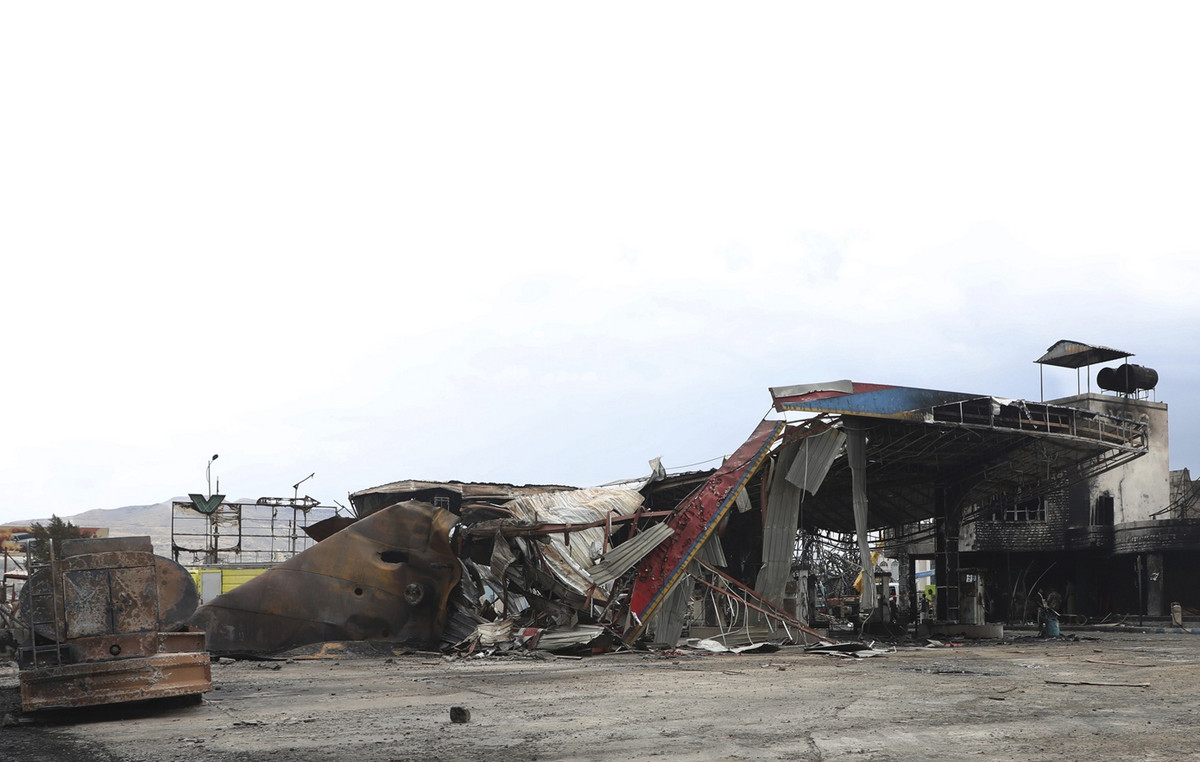100 days ago, libertarian Javier Milei gave his first speech as president, from the steps of the Argentine Congress, facing his supporters and his back to legislators. The symbolic gesture that broke the protocol of the inauguration ceremony announced a new way of doing politics in Argentina.
Since December 10, Milei has opened battle fronts not only with parliamentarians, but also with Argentine governors, journalists, artists and researchers, as well as presidents with whom he does not ideologically align – among them the Brazilian Luiz Inácio Lula da Silva, by retweeting posts of alleged persecution of the opposition in Brazil.
The Argentine president dialogues directly with his electorate on the networks – which he uses frantically, both with his own posts, retweets, sharing of memes and “likes” – and in several interviews he gives to the local press, but only to journalists he considers allies.
With the speech that he is passing the “chainsaw” on public spending and eliminating privileges of the political and business “caste”, he supported his economic plan on three main bases: the devaluation of the peso by around 50%, at once, in December, the signing of a mega-decree to deregulate the economy – which is in force – and a “bus law” that reforms different aspects of public administration, which ended up being withdrawn from Congress without being approved.
The devaluation of the peso led to a sharp increase in inflation in December and January: the index jumped from 12.8% in November to 25.5% in December and 20.6% in January. Price increases slowed to 13.2% in February, but still above the pre-Milei index, and the forecast is that in March they will be between 13% and 15%.

The inflationary effect of the devaluation and the deregulations of the economy by the mega-decree, which will remain in force if it is not blocked by the Chamber, in a session that does not yet have a date to take place, hit the most vulnerable population hard.
The data was reflected in the increase in poverty, which reached 57% in January, according to the most recognized body for this measurement in the country, the Argentine Social Debt Observatory, from the Catholic University (UCA).
Even so, with the exception of a large protest called by unionists on January 24th on the day of a general strike that was not significantly followed, there was no strong reaction in the streets. And, according to Argentine research institutes, despite a slight reduction in positive image, Milei has the approval of more than 50% of the population.
Economic analysts, in turn, are optimistic about the financial and fiscal measures. Both due to the recovery of the Central Bank's reserves, which Alberto Fernández's government left with a negative balance of around 12 billion dollars and which are still in the red, but at around 5 billion, and due to the reduction in the interest rate of 100 % to 80%, causing an appreciation of Argentine bonds.
Other positive aspects highlighted by economists were the beginning of debt payments with import suppliers, left by the previous administration, and the reduction of the gap between the official dollar and that sold on the parallel exchange market.
Not to mention the most vaunted achievement by the current government: a fiscal surplus for the second consecutive month. In February, the non-financial Public Sector reached a primary surplus of 1.2 billion pesos, equivalent to 0.2% of Argentine GDP, due to a monthly contraction in spending of 36.4%.

The concern is how the government will maintain the surplus in the face of the dilution of public employee salaries due to inflation, which explains part of the good fiscal results: public spending on retirement and pensions fell 38%, according to the Ministry of Economy.
“Milei applied policies that the market likes: he reduced the fiscal deficit with the dissolution of salaries and with the chainsaw, but tomorrow he will have to look for other ways, such as implementing new taxes, spending in a more orderly way”, explains Miguel Kiguel, director executive at consultancy Econviews.
According to him, the financial market's acceptance of the measures, with the reduction, for example, of the country's risk, is also due to the population's support for them. “Before, this wasn’t the case. Now, the discourse that the State must be responsible for everything, that the State must be very big, seems to be a discourse that Argentines are leaving behind”, he assesses.
Gaining the trust of the markets is the Milei government's bet so that it can, in the future, eliminate restrictions on the purchase of dollars, which remains restricted in the country, explains economist Camilo Tiscornia, director of the consultancy C&T Assessores Econômicos and professor of monetary economics at UCA.
“The government continues to maintain many restrictions from the previous government on the purchase of foreign exchange, and this is helping to achieve these results. Exporters do not freely dispose of foreign currency”, explains Tiscornia, also pointing out that part of the surplus is explained by the increase in taxation on the purchase of currency, called “Country Tax”, from 7% to 17% for some sectors, and the maintenance 30% for those who paid this fee.
To reach the surplus by February, Milei reduced subsidies, halted public works, put an end to some social plans, froze or reduced resources allocated to researchers at the National Council for Scientific and Technical Research (Conicet) – generating a reaction from almost 80 Nobel Prize winners , who sent a letter to Milei -, to federal universities and the National Institute of Cinema and Audiovisual Arts, among other public entities.
Social organizations denounce that the government stopped sending food to soup kitchens, which families use every day to have at least one meal a day.
The movements, united with left-wing parties, have made different protests against the measure, but the Milei administration states that it will not deliver aid to intermediaries, which it describes as “poverty managers”.
He also stopped the transfer of funds to the provinces, which generated a strong confrontation with governors, mainly from Patagonia. The governor of Chubut, Ignacio Torres, even threatened to stop sending gas to the rest of the country if he did not receive resources that should be delivered to his province.
There was also a postponement of some payments, such as subsidies for electricity companies, so that users continue to pay for energy at a discount, explains Tiscornia. At the same time, there were increases in energy bills and public transport fares, which rose by up to 255%.
For political scientist Pablo Touzón, Milei made all the adjustments he could from the Executive – devaluing the peso, stopping monetary issuance and achieving a fiscal surplus – but is faced with a lack of institutional tools.
“He has almost no legislative tools, today he has almost the same ones as when he started”, he explains.
Without sufficient political support, Milei's strategy to try to promote reforms was to sign, days after taking office, a mega-decree – a Decree of Necessity and Urgency (DNU) with more than 300 articles – which eliminated or modified several laws that had been approved by the Congress, such as the rent law or the one that regulated health plans.
Since the DNU came into force, there has been no regulation of the minimum term and transaction currency for signing rental contracts in Argentina, and many private health plans have reported increases of up to 40% monthly, which add up to more than 100% since December.
The DNU, which has to be approved or rejected by the Chamber at once, is considered unconstitutional by different constitutionalists. The part that changed the text's labor legislation was annulled by the Judiciary, and it is not yet known whether the government will have the strength among deputies to ensure that the decree remains in force.
“So far Milei has not had any success in Congress, this is a fight he will have to fight and we don’t know if he will be successful”, assesses Kiguel, pondering the need for parliamentary support to carry out structural reforms, such as taxes, social security and labor.
On the other hand, there is surprise among analysts at Milei's popularity despite the harshness of the adjustment and the strong recession that falls mainly on the middle class and more impoverished sectors.
“People continue to support his anti-system agenda. The radical revolution he proposes has popular support and I believe that part of the Argentine political system already accepts that there are reforms that need to be made”, points out Touzón.
Milei is efficient in channeling the rejection of the permanent crisis and traditional politicians. For him, there is bad mood on the Argentine streets, but it is still directed at the previous government. The question is how long the support will last.
“This won’t last forever. It will have to start showing results, especially in inflationary terms. There is anger on the Argentine streets and he channels it, but we don’t know for how long”, he concludes.
Source: CNN Brasil
Bruce Belcher is a seasoned author with over 5 years of experience in world news. He writes for online news websites and provides in-depth analysis on the world stock market. Bruce is known for his insightful perspectives and commitment to keeping the public informed.







